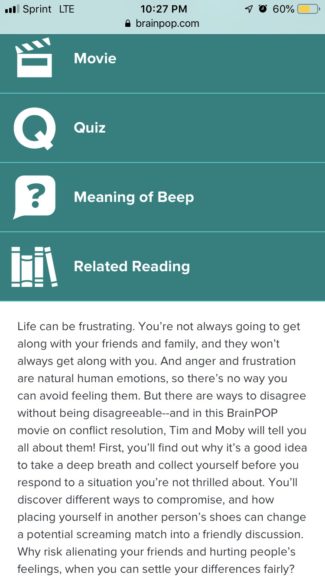Bastion
LQ: 9.15
Recommended Age: 10+
Skills Used: Planning, Working Memory, Mathematics, Reading

BrainPOP is an educational website that features curated lesson “plans”, as well as a large selection of games. The lesson plans incorporate videos, quizzes, games, idea maps, movie making, activities with original sources (such as Egyptian art), writing activities, and further reading. The games cover subjects such as science, math, and social studies, as well as topics like perspectives, fractions, and STEAM (science, technology, engineering, art, and math).
BrainPOP is geared towards upper elementary and middle school students. There are a large selection of free games, as well as a daily free topic that is a full lesson. Examples of free topics are sharks, ethics, and plate tectonics. There are also subscription plans which unlock a great deal more. They are available for a single classroom, schools or districts, homeschoolers, or families. Lower elementary students should use the companion site called BrainPOP Jr.
BrainPOP helps kids practice and improve the following skills:

There are three free math lessons available without a subscription. As of June of 2019, they were "Graphing and Solving Inequalities," "Pi," and "Division." There are also a large number of math games available covering topics from addition to area.
Reading on BrainPOP is incorporated in multiple areas in the lesson plans, and also under the heading "English". As of June 2019, the three English lessons that are free are "Theme," "Emily Dickinson," and "I vs Me." Reading and Writing skills are covered by English games and Language Arts games.
While the free lessons for this topic are limited to one that covers computer programming (as of June 2019), there are several games that deal with coding.
*With the wide variety of games available on BrainPOP, it is impossible to list them all here. The best way for a parent to find a game to work on a specific thinking skill is to try them out. However, we have listed below all of the thinking skills and what you should look for in a game that practices those skills.
Adapting and adjusting to changing conditions and expectations.
Flexibility requires a player to try new things and adjust to different obstacles. Games that work this skill will ask players to try more than one way to solve a problem or provide two or more different types of obstacles for the player to avoid.
Getting started and then maintaining attention and effort to tasks.
Focus skills include everything from getting started right away, ignoring internal or external distraction, and maintaining focus on short-term or long-term goals. Games with a short time limit or a small amount of correct answers needed to win will practice short-term goals. The longer the player has to focus to win the game, the more it practices "long-term goal" skills.
If you also want to practice initiating a task or ignoring distractions, the best games will include either a time limit or movement, or both. In those instances, a player who doesn't get started and keep their attention fully on the game will mess-up and fail to meet the completion goals.
Arranging and coordinating materials in order to complete a task.
Organizational skills are best practiced with games that require the player to place numbers or objects in a specific place or order according to specific rules. The BrainPOP game Sortify is a great example of this. This game gives the player several different things--such as a variety of animals in Sortify Animals. The goal of the player is to sort them into appropriate categories, that they choose themselves, such as putting the dragonfly, ant, and grasshopper in an insect folder.
Developing a systematic approach for setting and achieving goals.
Planning can occur in any game where the player needs to think about their move before they do it. While there are many games that require this if you dig through them, coding games, such as those on BrainPOP, are a reliable place to practice planning skills.
Understanding our own actions, thoughts and feelings.
Self-awareness games are less common. They require the player to have to think about character surroundings or health. Any game with a health meter or that requires a player to avoid obstacles in the environment can work the same "muscles" that self-awareness thinking skills use. BrainPOP also offers games under the health category that actually address things like conflict resolution, peer pressure, and cyberbullying.
Managing our actions, thoughts, and feelings.
Self-control is a skill that can be practiced on any game that frustrates or excites the player. If you find a game that you think your child would enjoy, but be challenged by, it is the perfect opportunity to practice anger and frustration management. A game that requires quick reaction time and causes the player's "engine" to run high also provides self-control practice. Either way, you know your child best. If it's a game that will challenge them it is probably a game that will provide them with self-control practice.
Being efficient and aware of our use of time and effort.
Time management games can be easy to spot. Any game that has a time limit element will require the player to exercise time management skills. Less obvious are the games which require the player to keep pace with moving obstacles. If they don't time their actions perfectly, they won't succeed in the game.
Recalling and retaining information in our minds while working.
Any game that requires the player to remember new information or (like math games) recall previously known facts is a game that allows the player to practice working memory skills. You can also look for games that require the player to follow more than one set of directions. That sort of following a list of directions will also exercise the player's working memory skills.
Finally, the way that BrainPOP sets up their lessons provides the prefect chance to practice working memory skills. They begin with a video, followed by quizzes, writing exercises, and games that ask the child to recall the information they learned, as well as applying it and deepening their understanding of it in new ways.
All membership plans come with full access to our entire suite of tools learning guides, and resources. Here are a few of the ones we think you’ll like the most: